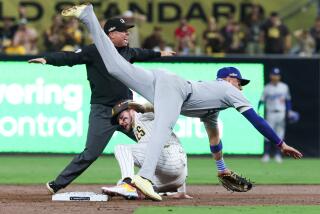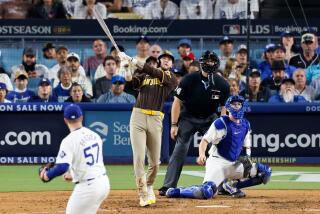Williams Leaves Himself Open for Second-Guessing
- Share via
SAN FRANCISCO — A day in the life of a baseball manager is a tapestry of decisions, and it would be simple to say the smart ones work and the dumb ones don’t.
Too simple.
In the late innings of the Padre season opener Tuesday afternoon against the San Francisco Giants, Dick Williams had a pair of decisions to make with opposing runners in scoring position and first base open.
He went against the so-called book on one occasion and with it on the other.
And neither worked.
In each instance, the Giants got a run-scoring single and came away with a 4-3 win.
The game-winning hit came in a textbook situation. With the winning run on second and one out, Williams instructed relief pitcher Luis DeLeon to intentionally walk David Green and bring Chris Brown to the plate. It was the obvious decision, one that 99 and 44/100ths of baseball’s managers have been making for eternity.
However, Brown poked a single into left field and Jeff Leonard raced home with the winning run.
“I was trying to hit the outside corner and make him fish for it,” DeLeon said. “I was trying to set him up for a fastball inside on the next pitch.”
There was no next pitch.
And there could be no second-guessing. Managers don’t get second-guessed, not when they go by the proverbial book.
“I pitch good against David Green,” DeLeon said, “but we had to walk him. That’s the way to play, because Brown’s a good man for a double play.”
Maybe on another day.
And that was not the way the Padres played it in the seventh inning, when the score was tied, 2-2, and left-handed Scot Thompson was pinch-hitting against right-hander LaMarr Hoyt with Bob Brenly on third base and Giant pitcher Mark Davis on deck.
Williams went against the book, and sent pitching coach Galen Cisco to the mound with instructions. It was one of those “don’t give him anything to hit” messages.
Daring decisions are dangerous decisions. The manager is almost in a no-win situation. If the pitcher gets out of the jam, he has courageously extricated himself. If he doesn’t, the manager has foolishly painted him into a corner.
On this occasion, Thompson hit the first pitch over shortstop to drive home the tie-breaking run.
An attempt to reconstruct the pre-Thompson conversation on the mound with catcher Terry Kennedy was revealing only in its terseness.
Was the possibility of walking Thompson discussed?
“He didn’t mention it,” Kennedy said.
Was he surprised that it wasn’t mentioned?
“He’s the pitching coach,” Kennedy said.
Did he do all the talking?
“Yep,” Kennedy said.
Cisco was merely relaying instructions from Williams.
“We went out and said we should pitch him tough,” Williams said, “but we didn’t pitch him tough. The first pitch was up over the plate.”
And Thompson, who hit .306 in 1984 and batted .353 with runners on scoring position in the late innings, slapped it into left field.
“I was supposed to be careful and not give him anything to hit,” Hoyt said, “and that was my intention. I wanted to work him in and out, but I didn’t get past the first pitch.”
And, shucks, he suggested, it wasn’t that bad a pitch.
“It was pretty much where I intended,” said Hoyt, whose Padre debut would result in no decision. “If I had just gotten it down a little bit, he wouldn’t have gotten it over the infield.”
When the locker room was almost empty, the manager still had not explained exactly why he did not simply walk Thompson rather than attempt to gingerly pitch around him. After all, he also would have forced the Giants to use up a pitcher and a pinch-hitter.
“Don’t you think I wish I would have?” he asked. “It was unfortunate and it was my fault. I’ll be responsible.”
It was no explanation, but Williams made it clear he was closing the book on going against the book.
Across the locker room, Hoyt was conversing with a Chicago writer who was covering the Padre debut of the man who won the 1983 Cy Young Award while pitching for the Chicago White Sox.
Hoyt was advised that he had thrown 70 strikes and 22 balls in the seven innings he worked.
“That’s about par,” Hoyt said, “except maybe I think I threw a few too many strikes.”
One too many, to be specific. His manager had gone against the book, and Scot Thompson had slammed it in his face.
More to Read
Go beyond the scoreboard
Get the latest on L.A.'s teams in the daily Sports Report newsletter.
You may occasionally receive promotional content from the Los Angeles Times.










